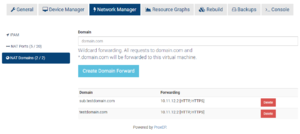Difference between revisions of "ProxCP NAT Domain Forwarding"
From ProxCP Documentation
| Line 1: | Line 1: | ||
On NAT nodes, ProxCP uses nginx reverse proxy to forward HTTP and HTTPS traffic to NAT virtual machines via domain names. | On NAT nodes, ProxCP uses nginx reverse proxy to forward HTTP and HTTPS traffic to NAT virtual machines via domain names. | ||
| + | |||
| + | If using a NAT domain, forwarding ports 80 and/or 443 for HTTP/HTTPS is not necessary. | ||
[[File:Nat-domain-forwarding.png|thumb]] | [[File:Nat-domain-forwarding.png|thumb]] | ||
| Line 9: | Line 11: | ||
== Domain Deny List == | == Domain Deny List == | ||
| − | ProxCP Daemon ships with a /nat/deny-domains.txt file. Any domains in this list cannot be forwarded for NAT by ProxCP users. The format is one unique domain per line. | + | ProxCP Daemon ships with a /nat/deny-domains.txt file. Any domains in this list cannot be forwarded for NAT by ProxCP users. The format is one unique domain per line. Sub-domains are also excluded if the root domain appears in deny-domains.txt. |
Latest revision as of 15:56, 23 July 2020
On NAT nodes, ProxCP uses nginx reverse proxy to forward HTTP and HTTPS traffic to NAT virtual machines via domain names.
If using a NAT domain, forwarding ports 80 and/or 443 for HTTP/HTTPS is not necessary.
Default Web Page
ProxCP includes a default web page on NAT Proxmox nodes. This page is displayed if there is no valid nginx proxy configuration for a given domain. You can edit this default web page (/var/www/html/index.html) to anything you want.
Domain Deny List
ProxCP Daemon ships with a /nat/deny-domains.txt file. Any domains in this list cannot be forwarded for NAT by ProxCP users. The format is one unique domain per line. Sub-domains are also excluded if the root domain appears in deny-domains.txt.
